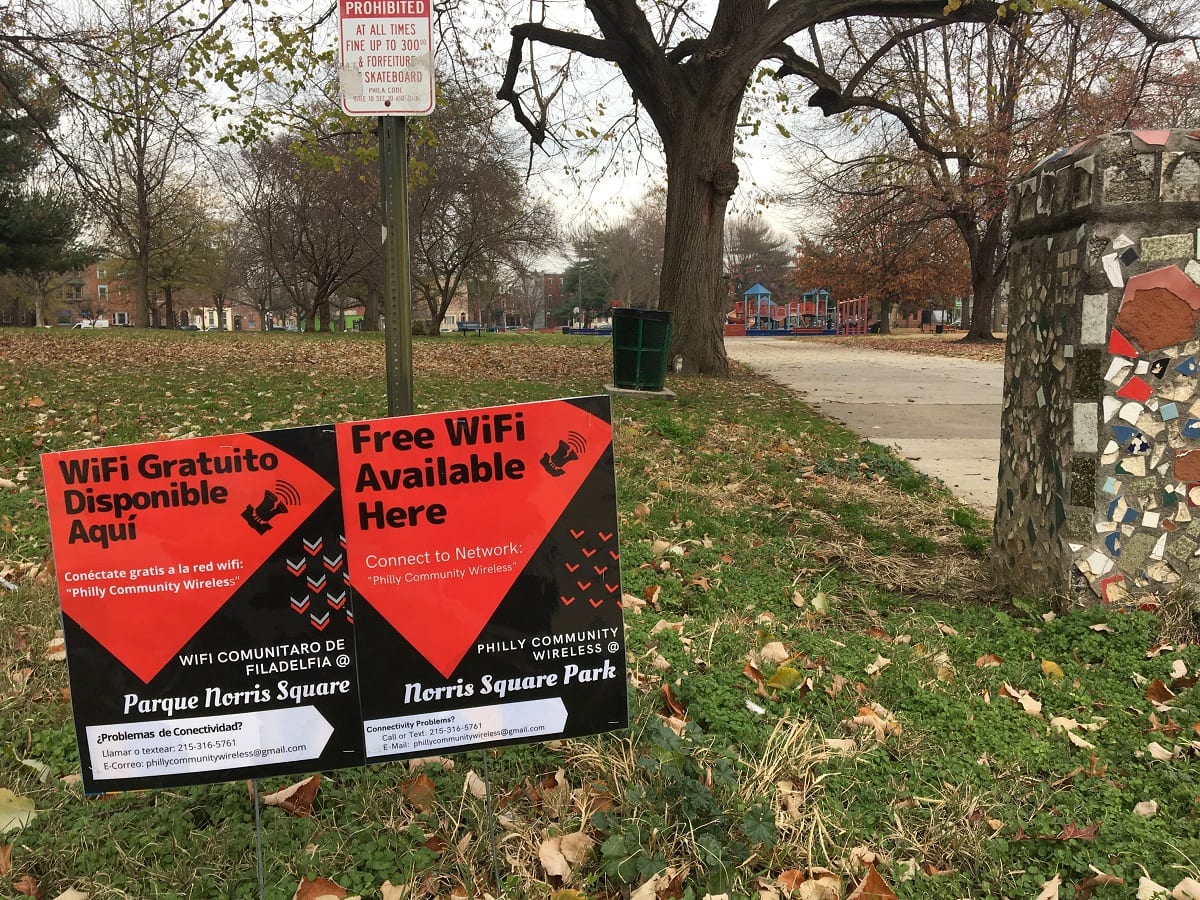By Camey VanSant, The Center for Digital Humanities
The COVID-19 pandemic has both exposed and exacerbated a critical issue: digital inequity. Lacking access to reliable high-speed internet, many struggle to participate fully in school, telemedicine appointments, Zoom meetings, and other activities crucial to education, health, and financial well-being today.
Supported by a Rapid Response Magic Grant from the Humanities Council, the Philly Community Wireless Project (PCW) is working to combat this problem by expanding internet access in areas of North Philadelphia.
“Philly Community Wireless began early in the pandemic, as a series of meetings among organizers, academics, teachers, and technologists,” explained Grant Wythoff, Digital Humanities Strategist at Princeton’s Center for Digital Humanities. The meetings evolved into the PCW steering committee, a diverse group comprising individuals associated with large Philadelphia institutions like the Free Library and Temple University, as well as community leaders from HACE, Called to Serve, and other local organizations.
What brings the group together? A commitment to tackling what Wythoff, a member of the steering committee, calls “long-simmering digital inequities in the city.” According to a March 2020 report by the Federal Reserve Bank of Philadelphia, only 53 percent of Black households and 44 percent of Latinx households in the Philadelphia area have access to broadband internet.
PCW is addressing this need by establishing community-owned and -operated mesh networks, which serve many users while needing relatively little infrastructure. Unlike traditional internet service providers, which rely on a centralized hub that sends bandwidth to all subscribers, mesh networks feature a system of routers that both send and receive traffic. Thus, mesh networks enable households to share connections and let access continue even if an individual router goes out.
The benefit of mesh networks? Efficiently and affordably, equipment installed in one household can provide reliable internet to residents of that home and of neighboring homes, as well as visitors and passersby.
Even better? The connection is free for all users.
“We’ve learned a lot from other groups deploying mesh networks in Pittsburgh, Baltimore, and New York,” explained Wythoff. At the same time, PCW collaborators remain focused on local conditions—on “how the shape of communities in this city inform the kinds of digital networks we want to build.”
To expand internet access in Philadelphia, PCW is partnering with locally based internet service provider PhillyWisper. This company is both donating bandwidth and providing technical support to PCW. As a net-neutral provider, PhillyWisper gives all users the same service for the same cost, instead of giving better access to certain users or offering some content only for a charge.
Establishing the mesh networks involves multiple steps. First, PCW will collaborate with community leaders to identify individuals who need and want internet access. Next, PhillyWisper technicians will install client radios, which resemble satellite dishes, on approximately one-third of the individuals’ homes. Finally, PCW will provide networking kits, each containing a mesh antenna, a router, and ethernet cables to residents of other homes.
Philly Community Wireless builds on PCW’s already extensive work to expand internet access. In fall 2020, PCW established outdoor public wifi for much of the Norris Square Park area. With additional funding from the Digital Literacy Alliance, part of the Mayor’s Fund for Philadelphia, PCW aims to provide access to households in the Norris Square area, which is home to many Philadelphians with limited English proficiency.
The two-year project builds from conversations between PCW and representatives from Latinx community organizations in Norris Square, which also stand to benefit from free internet. Not only will individuals gain access in their own homes, allowing them to do schoolwork, apply for jobs, and access online English classes, among other activities; community organizations can also expand programming, including live-streamed cooking and pottery classes or outdoor study spaces for students using computers.
The Norris Square project kicks off this February. By July, PCW hopes to have 33 antennas installed at homes in the neighborhood and to begin to distribute mesh kits to approximately 66 others. By the end of 2021, PCW hopes that 300 households will gain Internet access as a result.
In addition, the grant from the Digital Literacy Alliance will support a bilingual Community Engagement Liaison who will serve as a contact for potential users and oversee outreach to the Latinx community more broadly. This Liaison will identify area residents who currently don’t have access to high-speed internet, and connect them with PCW coordinators.
PCW’s plans also include a critical educational component. The Rapid Response Magic Grant will support four workshops by Community Tech NY, so that PCW members can learn more about topics from network kit installation to the principles of digital equity.
Next year, PCW will use this information to train residents to maintain and expand the network, offering important professional development opportunities for members of the community. By engaging residents in the technical side of the project, PCW will further its commitment to a community-owned and -operated systems.
PCW’s ultimate objective? To provide a model for free internet access that is replicable elsewhere in Philadelphia and functional for years to come.
“Longer-term, we’re thinking about how to build a sustainable network that outlasts the current crisis,” said Wythoff. “We’re in the process of drafting an agreement with Temple University that will allow us to install mesh antennas on their building rooftops, and we’re working with digital navigators at the Free Library to design our community outreach and training curricula.”
In other words, PCW hopes to turn a “rapid response” into a lasting transformation.
















